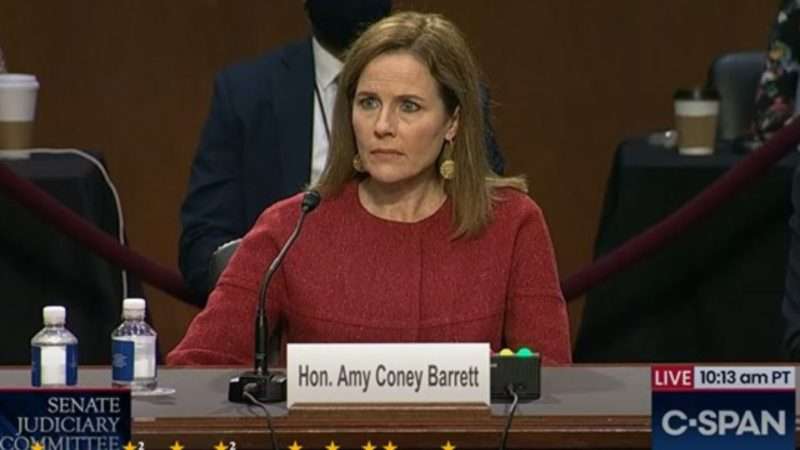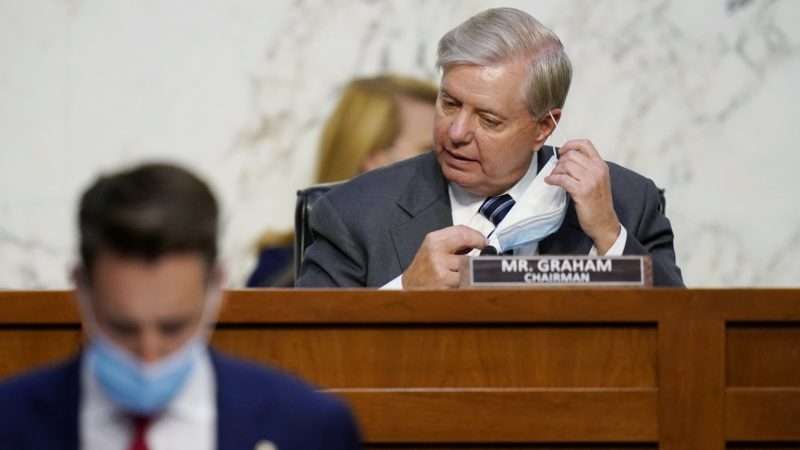

In a post published yesterday, I explained why Amy Coney Barrett is unlikely to vote to strike down the entire Affordable Care Act in Texas v. California, the case on that subject currently before the Supreme Court. In that post, I also described the background of the case and the issues at stake, in some detail.
Yesterday and today, Judge Barrett answered a number of questions about the ACA at her confirmation hearings. What she said doesn’t definitively tip her hand on how she might vote. But it does further reinforce my impression that she is unlikely to give the plaintiff Republican states and the Trump administration what they want. Most notably, she confirmed that she had voted to strike down the residual individual mandate but also sever it from the rest of the ACA in a recent moot court on the subject:
Supreme Court nominee Amy Coney Barrett said she did not strike down the Affordable Care Act (ACA) but did find its individual mandate unconstitutional in a recent moot court case, while stressing her actions in the moot court case did not actually reflect how she might rule on ObamaCare if confirmed to the high court….
“The vote was, in the panel, the majority said that the mandate was now a penalty and was unconstitutional but severable,” Coney testified in front of the Senate Judiciary Committee, referencing a moot court case she participated in at William & Mary Law School. “I voted to say that it was unconstitutional but severable.”
Barrett stressed that the moot court was just a hypothetical exercise and does not necessarily reflect her actual views of the case. But it is still at least somewhat indicative.
In addition, Barrett repeatedly stressed that the case currently before the Supreme Court comes down to severability, which is a different issue from the constitutionality of the individual health insurance mandate (a question on which she had been critical of Chief Justice Roberts’ 2012 ruling that the mandate should be upheld because it could be interpreted as a tax). This distinction is a crucial one, and Barrett’s emphasis on it further reinforces the view that she is unlikely to strike down the ACA as a whole.
I am far from the only commentator to reach this conclusion about Barrett’s position on the ACA case. Indeed, this seems to be an emerging consensus among experts. Yesterday, prominent liberal constitutional law scholar Eric Segall (who is no fan of Barrett’s) wrote that he “agree[s] with my libertarian friend on this” (the friend in question is me). That is at least somewhat notable, because he and I don’t agree on very many other constitutional law issues.
Earlier today, famed liberal Harvard Law School Professor Laurence Tribe tweeted that “[d]espite the great harm a Justice Coney Barrett will do, I predict she’ll join a 7-2 Supreme Court majority in holding the individual mandate severable from the rest of the ACA, including the protection of preexisting conditions. But she’ll join a 5-4 invalidation of the mandate.” I think the majority in favor of severability might well be even bigger than 7-2, and that the vote on invalidation of the mandate is likely to be 6-3 (with Roberts joining the other conservatives in holding that the residual mandate is now unconstitutional because it can no longer be considered a tax). But Tribe and I agree on the likely outcomes of the two parts of the case.
In my earlier post, I also explained why it’s highly unlikely that the plaintiffs will prevail on severability even if Barrett does vote in favor of their position. At least three of the other conservative justices signaled their hostility to that view in the recent robocall case, decided in June.
In my view a ruling striking down the residual individual mandate would be a significant decision enforcing constitutional limits on federal power. But it will have virtually no effect on the state of the ACA, given that the then-Republican controlled Congress rendered the mandate toothless in 2017. The fate of the ACA is what concerns the vast majority of other people interested in the case. ACA supporters should be happy to know that the law isn’t actually in real peril—at least not from this case.
Co-blogger Jonathan Adler points out that Barrett might potentially recuse herself from participating in the ACA case, because of her earlier involvement in the moot court on the subject. Unlike lower-court judges, Supreme Court justices have near-total discretion over recusal issues. I am skeptical that the moot court creates bias or conflict of interest sufficient to necessitate recusal. But I’m not an expert on recusal ethics, and therefore could be missing something here. If Barrett does recuse, she would, of course, have even less impact on the outcome of the case than I currently expect!
As I have emphasized previously, the history of ACA-related litigation is littered with failed expert predictions, including some of my own. In this instance, however, the evidence of the justices’ attitudes on severability is very strong, and the expert agreement on the subject cuts across ideological lines (which was not true in the debate over most previous ACA cases).
There are plenty of legitimate reasons to complain about the rushed nature of this confirmation process (I share some of those concerns myself), and also plenty of room for disagreement about Barrett’s jurisprudence (a topic I plan to write more about later this week). But she is unlikely to vote to strike down all of the ACA, and even more unlikely to have a decisive impact on the resolution of that issue.
from Latest – Reason.com https://ift.tt/34QPMt6
via IFTTT










